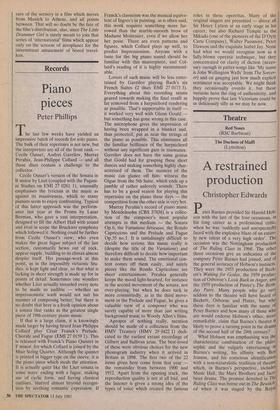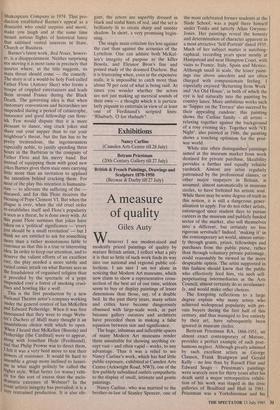Theatre
Red Noses (RSC Barbican) The Duchess of Maffi (Lyttelton)
A restrained production
Christopher Edwards
Peter Barnes provided Sir Harold Hob- son with the last of the four occasions, in his long career as a professional critic, when he was 'suddenly and unexpectedly faced with the explosive blaze of an entire- ly new talent of a very high order'. The occasion was the Nottingham production of The Ruling Class in 1968. The other three occasions give an indication of the company Peter Barnes had joined, and of the general accuracy of Hobson's instincts. They were the 1955 production of Beck- ett's Waiting for Godot, the 1959 produc- tion of Osborne's Look Back in Anger, and the 1959 production of Pinter's The Birth- day Party. Many people who go verY seldom to the theatre will have heard of Beckett, Osborne and Pinter, but who these days is familiar with the name of Peter Barnes and how many of those who are would endorse Hobson's other, more remarkable, claim that Barnes's theatre ls likely to prove a turning point in the drama of the second half of the 20th century?
What Hobson was emphasising was the characteristic combination of the philo- sophic and the vulgarly entertaining lo Barnes's writing, his affinity with Beo Jonson, and his conscious identification with a non-naturalistic tradition of theatre which, in Barnes's perspective, includes Music Hall, the Marx Brothers and Jaco- bean drama. The promise detected in The Ruling Class was borne out in The Bewitch' ed when it was staged by the RoYol
Shakespeare Company in 1974. That pro- duction established Barnes's appeal as a dramatist who could surprise and move, make you laugh and at the same time mount serious flights of historical fancy that satirised vested interests in State, Church or Business.
Barnes's latest work, Red Noses, howev- er, is a disappointment. Neither surprising nor moving it is most tame in precisely that quarter where, as the title suggests, its main thrust should come — the comedy. The story is of a would-be holy Fool called Father Flote (Antony Sher) who forms a troupe of crippled entertainers and leads them around France during the Black Death. The governing idea is that when customary conventions and hierarchies are suspended during a period of catastrophe, innocence and good fellowship can flour- ish. Few would dispute that it is more Pleasant to dance, sing crack jokes and share out your supper than to cut your neighbour's throat, but the fun has to be Pretty tremendous, the ingenuousness especially noble, to justify spending three hours in the Barbican in the company of Father Flote and his merry band. But instead of equipping them with good new Jokes Barnes gives them stale ones carrying little more than an invitation to applaud the intention behind cracking them. For most of the play this intention is humanita- rian — to alleviate the suffering of the — diseased, and for this Flote receives the blessing of Pope Clement VI. But when the Plague is over, when the old cruel order re-establishes itself and Flote's popularity Is seen as a threat, he is done away with. At this point Flote surmises that jokes have taken on a 'political' significance — 'every Jest should be a small revolution' — but I think we are entitled to ask for something More than a rather monotonous fable to Convince us that this is a true or interesting idea. In order to keep our attention, and to deserve the valiant efforts of an excellent cast, the play needed a more subtle and varied comic attack on what Barnes sees as the fraudulence of organised religion than Is provided by the spectacle of a pope suspended over a forest of smoking cruci- fixes and howling like a wolf.
This is the first production by a new National Theatre actor's company working under the general control of Ian McKellen and Edward Petheridge. When it was first announced that they were to stage Webs- ter's Duchess of Malfi many thought it an Unambitious choice with which to open. ,,When I heard that McKellen (Bosola) and retheridge (the Cardinal) were to appear, along with Jonathan Hyde (Ferdinand), and that Philip Prowse was to direct them, I felt it was a very bold move to test their Powers of resistance. It would be hard to assemble a group more inclined to luxuri- ate in what might politely be called the nigher style. What better (or worse) vehi- cle for this sort of excess than the melo- dramatic extremes of Webster? In the event artistic integrity has prevailed; it is a very restrained production. It is also ele-
gant, the actors are superbly dressed in black and sinful hints of red, and the set is brilliantly lit to create sharp and sinister shadow. In short, a very promising begin- ning.
The single main criticism lies less against the cast than against the acoustics of the Lyttelton. One can admire both McKel- len's integrity of purpose as the killer Bosola, and Eleanor Bron's fine and poised study of the doomed Duchess. But it is frustrating when, even in the expensive stalls, it is impossible to catch more than about 70 per cent of what is being said. At times you wonder whether the actors are not just making up metrical sounds of their own — a thought which it is particu- larly piquant to entertain in view of at least one of Ferdinand's scripted lines: 'Rhubarb, 0 for rhubarb'!











































 Previous page
Previous page